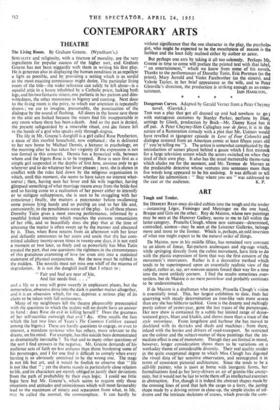CONTEMPORARY ARTS
THEATRE
The Living Room. By Graham Greene. (Wyndham's.) SEXUALITY and religiosity, with a tincture of morality, are the very ingredients for popular success of the higher sort, and Graham Greene has not been niggardly with them in writing his first play.
He is generous also in displaying the human condition in as repellent a light as possible, and by providing a setting which is as sordid as the most exacting connoisseur might desire. The particular living room of the title—the wider reference can safely be left alone—is a squalid attic in a house inhabited by a Catholic priest, lacking both legs, and his two fantastic sisters, one pathetic in her pietism and dim- wittedness, the other monstrous in bigotry and cunning. Next door to the living room is the privy, to which our attention is repeatedly drawn ; we are to imagine, presumably, the punctuation of the dialogue by the sound of flushing. All doors in the house save those in the attic are locked because the sisters find life insupportable in any room where there has been a death. And so the past is denied, the present safeguarded by a miserable ritual, and Ahe future left in the hands of a god who speaks only through dogma.
The lily in Mr. Greene's dunghill is a girl called Rose Pemberton, a niece of this morbid household, now orphaned ; she is delivered to her new home by Michael Dennis, a lecturer in psychology, on the morning after he has taken her virginity (if the expression is not too formal in this context). Dennis has a hysterical wife, between whom and the bigots Rose is to be trapped. Rose is seen first as a simple girl suspended in the depths of first love, anxious only to go wherever and to do whatever her lover pleases ; next, she is shown in conflict with the rules laid down by the religious organisation in which, until this moment, she seems to have taken no interest what- soever ; then, having seen her lover and his wife together, having glimpsed something of what marriage means away from the bride-bed and so having come to a realisation of her power either to intensify or to mitigate unhappiness, she is seen to be struggling with her conscience ; finally, she mutters a paternoster before swallowing some poison lying handy and so putting an end to her life and, conveniently, to the penultimate scene of the In all these phases Dorothy Tutin gives a most moving performance, informed by a youthful lyrical intensity which matches the extreme romanticism of her role, and so beautifully does she play that at the time of utterance the matter is often swept up by the manner and obscured by it. Thus, when Rose returns from an afternoon with her lover and defiantly announces to her aunts and uncle that she has com- mitted adultery twenty-seven times in twenty-one days, it is not until a moment or two later, so finely and so posVerfully has Miss Tutin created the part, that one questions the rightness in the circumstances of this gratuitous cramming of love (or even sin) into a statistical statement of physical conjunction. But the nose must be rubbed in the midden. The nostrils must not miss one whiff of the miasma of degradation. It is not the dunghill itself that I object to ; " Fair and foul are near of kin, And fair needs foul. . . ."
and a lily or a rose will grow sweetly in unpleasant places, but the remorseless, obsessive drive into the dark is another matter altogether, and it is an obsession which, for me, deprives a serious play of its claim to be taken with full seriousness.
Many of my neighbours left the theatre pleasurably preoccupied with the questions to which the zealots will no doubt have an answer to hand : does Rose do evil in killing herself ? Does the greatness of her self-sacrifice outweigh that evil ? &c. (One recalls the fuss which the last two lines of Yeats's The Countess Cathleen caused among the bigots.) These are hardly questions to engage, or even to interest, a mundane reviewer who has others, more relevant to the drama, on his mind. For example, has this Suicide been demonstrated as dramatically inevitable ? To that and to many other questions of the sort I find answers in the negative. Mr. Greene demands of his audience acts of faith no less arduous than those burdening some of his personages, and I for one find it difficult to comply when every turning is so obviously contrived to be the wrong one. The stage is not life but art, and it would be foolish to observe that " life is not like that " ; yet the drama stands in particularly close relation to life, and its characters are sternly obliged to justify their deviations from the path of probability by their own logic, I could see little logic here but Mr. Greene's, which seems to require only those situations and attitudes and'coincidences which will most favourably lead to the maximum of misery and separation from what, in life, may be called the normal, the commonplace. It can hardly be without significance that the one character in the play, the psycholo. gist, who might be expected to be the mouthpiece of reason is the feeblest and the least fully realised either by author or actor.
But perhaps one errs by taking it all too solemnly. Perhaps Mr. Greene in time to come will preface the printed text with that label, " an entertainment," which we know from some of his novels. Thanks to the performances of Dorothy Tutin, Eric Portman (as the priest), Mary Jerrold and Violet Farebrother (as the sisters), and Valerie Taylor, in her brief appearance as the wife, and to Peter Glenville's direction, the production is striking enough as an enter-


































 Previous page
Previous page